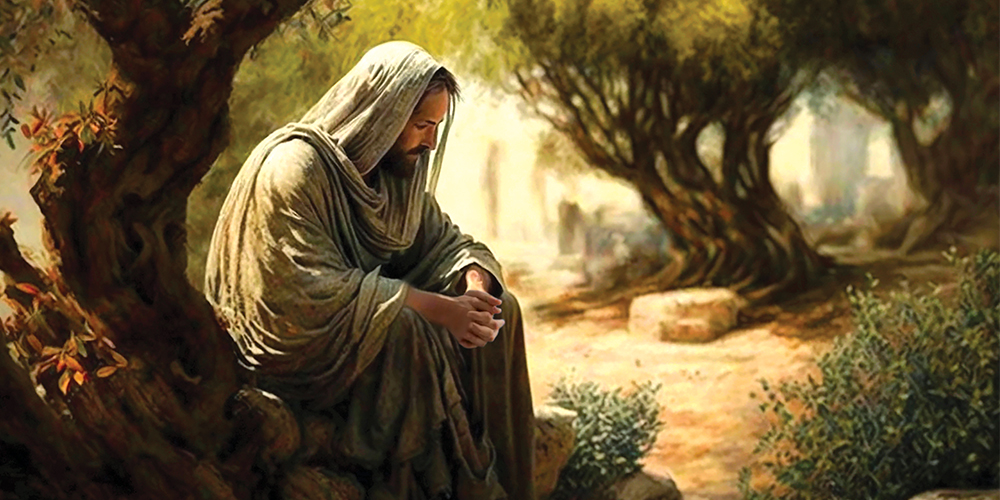 |
Jesus’ betrayal, arrest, and surrender in the Garden of Gethsemane remind us of his love for all sinners.
Several years ago, my wife and I went to New York City. We decided to visit the 9/11 Memorial, and I was left stunned by what I saw there. A fire truck with its back half burned and mangled. Giant metal girders left twisted, as though they were nothing more than plastic straws. A room with 2,983 portraits of victims, an audio of remembrances left by their family members playing over a speaker.
Does it seem strange to visit a place where one of our nation’s worst tragedies happened? Why would we go back?
We go back to remember what was lost. We go back to remember what sacrifices were made. This is also why we go back to the Garden of Gethsemane, a place where we find some of the awfulness that led up to Jesus’ sacrifice on the cross.
I vividly remember the midweek Lenten services at my church while growing up. As part of the Passion History reading, images would sometimes be projected on a wall of the sanctuary. They showcased scenes from those final hours of Jesus’ sufferings. Painful scenes. This garden that we know so well is full of mostly sad and bitter things, which, strangely, is why it’s so important to us. Jesus went to this garden because it was a peaceful spot to pray, but chaos was about to erupt. Here we can draw a line from Eden to Gethsemane, as the peaceful relationship between God and humanity was wrecked. We find in Gethsemane betrayal, arrest, and surrender.
Betrayal
By the time Jesus knelt to pray in Gethsemane, so much had been lost from that first garden. God had given Adam and Eve a literal paradise. He then chose to walk with them through this garden. Think about the intimacy of that relationship. That’s exactly what makes their betrayal of him in Genesis chapter 3 so miserable.
Betrayal always hurts more when it comes from someone you love. We profess our love for God today, but we also know what it means to stab him in the back for far less than what Judas got. The eyes reading this article, how have they disobeyed God just today? What have they seen? The hands that hold this magazine or device, how have they made you a Benedict Arnold? Was it worth it?
Jesus must put himself in a position to be betrayed; he must come close to us. He knew the betrayal was coming, but he went anyway. Did Jesus’ eyes ever well up as he read Psalm 41:9? “Even my close friend, someone I trusted, one who shared my bread, has turned against me.” I think Jesus’ anticipation of it all is what gets me every Lent. He knew the hard thing was coming and walked right toward it. I have sat with my wife in the preoperative room several times before her major surgeries, and, even as I found confidence in God’s promises, I still was a wreck, knowing that the hard thing was coming. I think of this and imagine Jesus on the ground of the garden.
I’ve never been on the floor in anguish over something that’s about to happen, but I’ve felt my stomach lock up like a vault. I’ve been fixated on a problem, unable to think about anything else. I’ve broken out in sweat as I considered the hard thing I had to do. That’s because I’m a human being. Jesus is all-powerful as the Son of God, but he’s not a robot. We see his humanity in Gethsemane. His back would soon be torn apart by the whip, but as he told his disciples to arise and face his betrayer, there already was a figurative knife handle sticking out between his shoulder blades.
“Do what you came for, friend” (Matthew 26:50).
Two thousand years later, these words to Judas still leave me in awe. “Friend”—said sincerely, not sarcastically. More than that, Jesus would soon take this betrayal on his shoulders, as if he was the one who had betrayed the world’s most loyal man for 30 pieces of silver.
Arrest
Did the people in this large crowd feel tough as they approached Gethsemane with their clubs and torches? They had all week to arrest Jesus while he was doing what they thought was wrong, but they came to arrest him while he was praying for the strength to save them. Jesus could have read off a list of charges for all those who came to arrest him; he knew their deepest, darkest secrets. Soon those charges would be placed upon him on the cross.
Jesus knew the arrest was coming and went to the garden anyway. The hands they bound were the hands of the one who formed the earth—the one who laid the earth’s foundation and shut up the sea behind doors. Did these men still feel tough as they got up from the ground and brushed the dirt off their clothes? They had fallen to the ground at a few words from their suspect’s mouth: “I am he” (John 18:6). These were not merely unfortunate things that happened to Jesus in this garden but gears turning in a very complex salvation machine.
Most of us do not have law degrees, but we know injustice when we see it in this garden. Normally when we see a police cruiser—blue and red lights flashing—pulling up behind a vehicle and officers searching a trunk and putting a person in cuffs, we assume the worst. We think the person must be guilty. But in Gethsemane, the person being treated like a criminal was the perfect Son of God.
There is freedom for us in Gethsemane but only at the cost of Jesus being captured.
Surrender
The battle in the first garden seemed to end relatively quickly. Eve offered a brief defense of God’s command, but she and Adam were chewing forbidden fruit moments later. Most shocking in this chapter, however, is not their surrender to sin, but how quickly God announced a plan of victory for them. To carry out that plan, the most powerful man this world has ever known would have to surrender. Those hands bound in Gethsemane had never been raised to harm anyone, though the potential to do so was humming through them like a power line.
Jesus knew the surrender was coming and went anyway. Jesus was in this second garden because of us. It was a necessary step to get us to the final garden, the restored Eden the apostle John describes in Revelation chapters 21 and 22. Redemption is a beautiful but brutal concept, which makes it so fitting for Lent. There is freedom for us in Gethsemane but only at the cost of Jesus being captured. He surrendered because we so often surrender to sin.
As you enter the 9/11 Memorial, you see a large quote on a wall: “No day shall erase you from the memory of time.” This quote from the Roman poet Virgil fits the museum’s goal for us to keep in mind these people who lost their lives. As we enter Lent and the Garden of Gethsemane this year, we know we will find painful memories there: betrayal, arrest, and surrender. Most important, however, when we spend these 40 days remembering what Jesus did, we know we will find love. Unconditional love makes its home in this garden. And we are stunned when we see it.
Author: Alexander Groth
Volume 111, Number 03
Issue: March 2024







